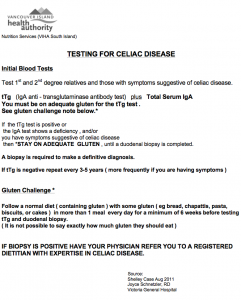How Long is Long Enough for a Gluten Challenge?

You think gluten may be a problem for you so you remove gluten from your diet and feel so much better. You ask your GP to blood test you for celiac disease and you’re asked to go back to eating 2-4 servings of gluten per day for six weeks first. Say what?!
It turns out that six weeks may not be long enough to re-trigger the disease so that doctors can measure the damage. Studies show that a gluten challenge (consuming 2-4 servings per day) may require three months – or more.
A clinical review, published in 2013, of all relevant studies reporting on the clinical response to gluten challenge by adult or pediatric patients with suspected or diagnosed coeliac disease (CD) sought to determine a standardized approach regarding the amount and duration of dietary gluten necessary to provoke a clinical response in children and adults could provide guidance to physicians and investigators.
To diagnose pediatric patients with suspected CD on a gluten-free diet, a moderate-to-high dose gluten challenge for up to 3 months should be sufficient to induce changes in mucosal histology and antibodies in the majority of patients.
However, it was observed that in adults on a gluten-free diet, histological and serological relapse rates to gluten may be slower and prolonged challenge may be considered if no relapse is observed.
Hope was offered through the combined testing of conventional and new early markers with high sensitivity and specificity will significantly shorten the time of gluten challenge to diagnose CD.
 The Study
The Study
In The Clinical Response to Gluten Challenge: A Review of the Literature by Maaike J. Bruins, researchers evaluated the effect of gluten challenge on changes in symptoms, intestinal mucosa histology, and serum antibodies. In the reviewed studies, doses ranged from 0.2 to 30 g/day of wheat gluten or comprised a gluten-containing diet.
The onset of symptoms upon gluten intake varied largely from days to months and did not parallel serum antibody or histological changes. Within 3 months of gluten challenge, 70%–100% of pediatric CD patients became positive for AGA-IgA and EMA-IgA antibodies and 50%–70% for AGA-IgG.
A limited number of trials suggest that no more than half of adult patients developed positive AGA-IgA, EMA-IgA, tTG-IgA or DGP-IgA/IgG titers. Approximately 50%–100% of pediatric and adult patients experienced mucosal relapse of gluten provocation within 3 months, which was preceded by increased mucosal intra-epithelial lymphocytes within several days of challenge.
 The Conclusion
The Conclusion
A 3-month high-dose gluten challenge should be suitable to diagnose the majority of CD patients. In some cases prolonged challenge may be needed to verify diagnosis. A combination testing for antibodies and mucosal histology may hasten the diagnosis.
What to do?
Significant health complications may occur when celiac patients remain on [or are asked to return to] a normal gluten-containing diet. Therefore, if you suspect that gluten may be causing problems to your health before you go gluten free. Get tested while you are still consuming a diet with normal amounts of gluten i.e. 2-4 servings per day. Click here for Celiac Disease Testing Protocol
A confirmed diagnosis for celiac disease provides you with the following benefits*
- It confirms that a lifelong, strict gluten free diet is essential for healing. Treatment for a gluten intolerance or gluten allergy may not need to be as strict.
- Celiacs who choose to follow a strict gluten free diet, can gain NOT ONLY symptom relief BUT also gain long term health benefits (i.e. preventing osteoporosis, preventing lymphoma , preventing nutrient deficiencies, preventing infertility etc.)
- Treatment for a gluten intolerance or gluten allergy is more about symptom control rather than preventing long-term complications.
- It lessens the desire and choice to eat gluten and increases the chances that a strict gluten free diet will be followed for life.
- It gives you the option of a ‘Medical Expense Tax Credit .”
- It provides a foundation for proper medical treatment .
- A referral to a gastroenterologist.
- A referral to a registered dietitian with expertise in celiac disease. Have physician fax referral to 250-727-4168.
- Testing of iron status (including serum ferritin )
- Testing of B12 status
- Testing of Vitamin A status (for those with night blindness or chronic diarrhea)
- Testing of Vitamin D status
- Testing of Bone Density (for adults )
- Ruling out lactose intolerance
- Ruling out other food intolerances, food sensitivities or food allergies
- Follow up with family physician, gastroenterologist and registered dietitian when abnormal blood tests do not normalize or symptoms persist.
1. If you suspect that you react to gluten AND all your celiac tests were normal OR you have chosen to stay gluten free and not be tested for celiac disease , you can have your physician refer you to a registered dietitian with expertise in gluten intolerance and gluten allergies. In Victoria and Vancouver Island, fax referrals to 250-727-4168.
2. A crash course on transitioning to a gluten-free diet open to anyone wishing to address wheat and gluten allergies or sensitivities, as well as those who have been diagnosed with celiac disease is offered every month at Thrifty Foods. Details here!
*Shelley Case August 2011, Joyce Schnetzler, RD Victoria General Hospital, Nutrition Services (VIHA South Island)













